unit1讲义
Unit1CulturalHeritage单元分析讲义-高中英语人教版

Unit 1 Cultural Heritage单元分析本单元主题:人与社会——文化遗产保护一、单元内容分析本单元围绕文化遗产保护的主题展开,讲述了中外文化遗产的历史与现状、所面临的问题,以及相应的解决办法等。
旨在引导学生结合自己所学知识和兴趣特点,积极思考如何力所能及地参与文化遗产保护,并付诸行动。
以下为教材各部分教学内容简要分析及教学活动实施建议:1.Opening Page主题图上有两个并肩坐在长城台阶上的孩子,他们眺望着从脚下绵延伸向远方的万里长城,寓意为保护文化遗产应该从小做起,从青少年做起,既要脚踏实地,又要面向未来。
开篇页引言“Heritage is our legacy from the past,what we live with today,and what we pass on to future generations.-World Heritage Centre”是世界遗产中心给遗产下的定义,即“文化遗产是过去人类所创造的,由现代人类继承并传之后世”。
文化遗产是把人类的过去、现在和未来联系起来的纽带。
2.Listening and Speaking:Take part in a youth project 听力文本是关于一个国际青少年文化遗产保护项目的采访。
采访围绕三个主要内容展开:Stephanie 和Liu Bin所参与的国际青少年文化遗产保护项目简介,选择泰山作为项目开展的地点的原因,以及他们保护泰山文化遗产的具体做法。
活动设计从记者采访到采访笔记,再到完整的新闻报道,为本单元的写作任务做了铺垫。
通过一系列的听力活动,检测学生获取主旨大意和关键细节的能力,并培养学生根据上下文猜测词义的能力。
学生综合运用前面听力活动中获取的信息,再结合自己的相关知识和经验,就可以针对文化遗产保护项目的参与意愿和方式展开探讨,从而实现语言输出。
3.Reading and Thinking:Understand how a problem was solved 通过分析和探讨在修建阿斯旺大坝的过程中文化遗产保护所面临的挑战与问题以及解决过程和办法,使学生理解并关注国际合作在问题解决过程中的关键作用,重视文化遗产保护与社会经济发展的平衡与协调关系,鼓励学生积极面对挑战,善于合作,不断努力,寻求解决问题的合理途径和方式。
Unit1讲义 人教版英语九年级全册

Unit1 How can we become good learners?1.What about reading aloud to practice pronunciation? What about =How about Why don’t you... Why not... Would you like... Let’s...辨析: aloud,loud与loudlyaloud:(adv)大声地(与call,shout,cry等连用)(adv)出声地(与read等连用)Eg: Please read the text aloud.loud: (adj)大声的(可作定语或表语)Eg: The music is too loud.Please turn it down.(adv)响亮地;高声地(与speak,talk,sing,laugh等连用) Eg:Speak loud,please,or no one will hear you.loudly: (adv)高声地(含有喧闹的意味) (与knock,ring等连用) Eg: Suddenly the bell on the wall rang loudly.注意: ①前缀a(n)表示加强意义eg: aright正确地awake唤醒announce宣布;通告②a与名词或动词结合构成形容词/副词Eg: a+sleep (n.睡眠)=asleep (adj睡着的)a+side(n.边)=aside(adv在旁边)a+head(n.头)=ahead(adv在前面)a+live(v居住)=alive(adj活的)2.Why did Wei Fen find it difficult to learn English?此句的结构的: find it+adj+to do sth. 发现做某事...(其中it为形式宾语,真正的宾语是后面的动词不定式.句中adj为宾补)类似的结构还有:①make it+adj+to do sth. 使做某事...②think it+adj+to do sth. 认为做某事...其他几种“find+宾语+宾补”结构①find+宾语+adj 发现某人或某物Eg: She found the work very dull.②find+宾语+adv (其中副词通常是: in,out,up,down,upstairs等) Eg: I went to her house,but I found her out.③find+宾语+介词短语Eg: When he woke up,he found himself in hospital.④find+宾语+doing sth.Eg:Did you find a woman standing under the tree?⑤find+宾语+(to)do sth.Eg: I found Mary (to) clean the classroom.3.I was afraid to ask questions because of my poor pronunciation.辨析: be afraid to do sth.与be afraid of doing sth.be afraid to do sth. 害怕做某事. 根据经验或常识不敢去做某事,或没有勇气去做某事.Eg: He was afraid to go out at night.be afraid of doing sth. 表示担心会发生某事或某情况(但实际上未必会发生),或不敢做某事(指缺乏勇气或因害怕其后果而不敢)Eg: She was afraid of waking up her husband,for he was ill.4.Although I could not understand everything the characters said,... although (conj) 即使;纵然;虽然相当于though,两者可通用(用来引导让步状语从句,既可以位于主句之前,也可以位于主句之后)辨析: although与though①用作连词,表示“虽然”二者可互换,但although与though 更加正式.在同一个句子中,although与though不能与but连用,但可以与yet 连用.Eg: Although he was tired,he went on working.②Although一般不用作adv,而though可作adv,且一般位于句末,译为:可是;不过.Eg: It’s hard work;I enjoy it,though.③as though(好像;仿佛),even though(即使;纵然)等固定短语中。
Unit1Ilikedogs知识点讲解(讲义)译林版英语四年级上册
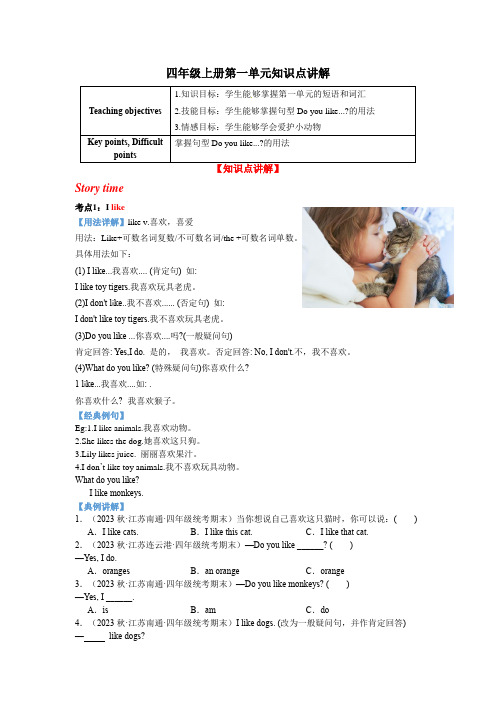
四年级上册第一单元知识点讲解Teaching objectives 1.知识目标:学生能够掌握第一单元的短语和词汇2.技能目标:学生能够掌握句型Do you like...?的用法3.情感目标:学生能够学会爱护小动物Key points, Difficultpoints掌握句型Do you like...?的用法【知识点讲解】Story time考点1:I like【用法详解】like v.喜欢,喜爱用法:Like+可数名词复数/不可数名词/the +可数名词单数。
具体用法如下:(1) I like...我喜欢.... (肯定句) 如:I like toy tigers.我喜欢玩具老虎。
(2)I don't l i ke..我不喜欢...... (否定句) 如:I don't like toy tigers.我不喜欢玩具老虎。
(3)Do you like ...你喜欢....吗?(一般疑问句)肯定回答: Yes,I do. 是的,我喜欢。
否定回答: No, I don't.不,我不喜欢。
(4)What do you like? (特殊疑问句)你喜欢什么?1 l i ke...我喜欢....如: .你喜欢什么? -我喜欢猴子。
【经典例句】Eg:1.I like animals.我喜欢动物。
2.She likes the dog.她喜欢这只狗。
3.Lily likes juice. 丽丽喜欢果汁。
4.I don’t like toy animals.我不喜欢玩具动物。
What do you like?--I like monkeys. -【典例讲解】1.(2023秋·江苏南通·四年级统考期末)当你想说自己喜欢这只猫时,你可以说:() A.I like cats.B.I like this cat.C.I like that cat. 2.(2023秋·江苏连云港·四年级统考期末)—Do you like ______? ()—Yes, I do.A.oranges B.an orange C.orange3.(2023秋·江苏南通·四年级统考期末)—Do you like monkeys? ()—Yes, I ______.A.is B.am C.do4.(2023秋·江苏南通·四年级统考期末)I like dogs. (改为一般疑问句,并作肯定回答)— like dogs?— , I .5.(2023秋·江苏南通·四年级统考期末)(Do / Are) you like the ball?考点2:Look at these toy animals.看这些玩具动物。
Unit1知识点梳理及语法讲义-2024-2025学年人教版英语八年级上册

八年级上册英语Unit 1知识点与语法精讲精练词汇梳理(一)完成单词梳理:名词:1. hen母鸡 2. pig 猪 3. diary 日记;记事簿4. activity 活动5. paragliding 滑翔伞运动6. bird 鸟7. bicycle 自行车8. building 建筑物;房子9. trader 商人10. difference 差别;差异11. top 顶部;表面12. umbrella 伞;雨伞13. hill 小山;山丘14. duck 鸭动词:1. seem 好像;似乎;看来 2. decide 决定;选定 3. wonder 想知道;琢磨4. wait 等待;等候代词:1. anyone 任何人 2. something 某事;某物 3. nothing 没有什么4. everyone 每人;人人;所有人5. myself 我自己;我本人6. yourself 你自己;您自己7. someone 某人副词:1. anywhere 在任何地方形容词:1. wonderful 精彩的;绝妙的 2. bored 厌倦的;烦闷的3. enjoyable 有乐趣的;令人愉快的4. wet 湿的;潮湿的5. hungry 饥饿的兼类词:1. few (adj/pron)不多;很少 2. most (adj/adv/pron)最多;大多数3. try (n/v)尝试;设法;努力4. below (prep/adv)在……下面5. enough (adj/adv)足够的(地)6. dislike (v/n)不喜爱(的事物)7. as (adv)像……一样(conj)当……时;如同(二) 词汇变形小结:1. wonder (v. 想知道) — wonderful (adj. 精彩的;绝妙的) — wonderfully (adv. 精彩地)2. bore (v. 使……厌烦) — bored (adj.厌倦的)— boring (adj.令人厌倦的)3. diary (n. 日记) — diaries (复数)4. enjoy (v. 喜爱) — enjoyable (adj. 有乐趣的;令人愉快的)5. activity (n. 活动) — activities (复数)6. decide (v. 决定) — decision (n. 决定)7. build (v. 建造) — building (n. 建筑物;房子)8.trade (n/v贸易;买卖) — trader (n. 商人)9. difference (n. 差别;差异) — different (adj. 不同的)10. wait(v. 等候;等待) — waiter (n. 男服务员) — waitress (n. 女服务员)11. like(v. 喜欢)— dislike 反义词(v.不喜欢)【练一练】用所给词的适当形式填空1.–Mom. I plan to wash clothes by ___myself____(I) this summer vacation.- Good girl! Go for it.2.Can you tell me some __differences___(different) between the two pictures?3.The students have quite a few activities (activity) after class. They can sing, dance and play basketball.4.I think it will be a very enjoyable (enjoy) trip for you to travel to Beijing.5.His cousin is a trader (trade), selling fruit and vegetables.6.The TV show is really boring (bore). I don’t want to watch it.7.As a teacher, Mr. Green always tries to make his lessons _enjoyable__(enjoy).8.This film is _wonderful___ (wonder). I like to see it very much.9.I can look after __myself____(my). Don’t worry about me.10.You must look after __yourself____(you) well while I'm away, Tom.(三) 短语攻关:go on vacation去度假stay at home 待在家里go out 出去quite a few 相当多;不少most of the time大部分时间of course当然have a good time=enjoy oneself 玩得高兴feel like 给……的感觉;感觉像take photos 拍照;照相keep a diary 写日记buy sth for sb 买某物给某人decide to do sth 决定做某事something important 重要的事find out 找出;查明in the past 在过去make a difference 产生影响;起作用enjoy doing sth喜欢做某事too many 太多arrive at/in 到达because of 因为;由于wait for 等待;等候start to do /doing sth开始做某事知识点梳理1.We took a few photos there.我们在那里拍了很多照片。
【新教材】牛津译林版(2024)七年级上册英语Unit 1单词讲义

【新教材】牛津译林版(2024)七年级上册英语Unit 1单词讲义1.greet (v.打招呼)近:welcome(v.欢迎),salute (v.敬礼) 反:ignore(v.忽视),avoid (v.避免) 派:greeting (n.问候)I always greet my neighbors with a smile when I see them. 当我看到邻居时,我总是微笑着问候他们。
2.introduce(v.介绍) 近:present (v.呈现), 反:conceal(v.隐藏), 派:introduction(n.引言/介绍)Let me introduce you to my colleague,Dr.Smith. 让我把你介绍给我的同事史密斯博士。
3.each other (phrase 彼此)近:one another (phrase互相)They looked at each other and laughed. 他们互相看了看,笑了。
4.go by(v.走过,流逝)近:pass(v.通过),elapse (v.消逝)反:stay(v.停留),remain(v.保持)派:going by (n.经过),gone by (adj.过去的)She goes by her middle name,Marie,instead of her first name. 她用她的中间名玛丽,而不是她的名字。
5.glad (adj.高兴的)近:happy (adj.快乐的),pleased(adj.满意的)反:sad(adj.悲伤的),unhappy (adj.不快乐的)派:gladly (adv.高兴地)I'm so glad you could come to my party. 你能来我的聚会,我很开心。
6.same(adj.相同的)近:identical (adj.相同的),similar (adj.相似的)反:different (adj.不同的),various(adj.多样的)派:sameness (n.相同)We have the same idea about where to go for dinner. 我们对去哪里吃饭有同样的想法。
Unit 1 知识重点总结讲义--高中英语外研版(2019)必修第一册
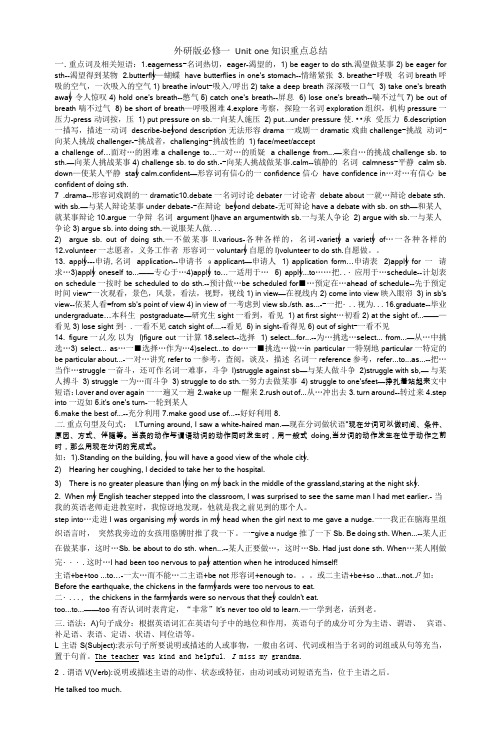
外研版必修一Unit one知识重点总结一.重点词及相关短语:1.eagerness-名词热切,eager-渴望的,1) be eager to do sth.渴望做某事2) be eager for sth--渴望得到某物 2.butterfly—蝴蝶have butterflies in one's stomach--情绪紧张 3. breathe-呼吸名词breath呼吸的空气,一次吸入的空气1) breathe in/out-吸入/呼出2) take a deep breath 深深吸一口气3) take one's breath away 令人惊叹4) hold one's breath--憋气5) catch one's breath--屏息6) lose one's breath--喘不过气7) be out of breath 喘不过气8) be short of breath—呼吸困难4.explore考察,探险一名词exploration组织,机构pressure一压力-press 动词按,压1) put pressure on sb.一向某人施压2) put...under pressure 使.••承受压力 5.description 一描写,描述一动词describe-beyond description 无法形容drama一戏剧一dramatic 戏曲challenge-挑战动词-向某人挑战challenger--挑战者,challenging-挑战性的1) face/meet/accepta challenge of…面对…的困难a challenge to…一对…的质疑 a challenge from...—来自…的挑战challenge sb. to sth.—向某人挑战某事4) challenge sb. to do sth.--向某人挑战做某事.calm--镇静的名词calmness-平静calm sb. down—使某人平静stay calm.confident—形容词有信心的一confidence 信心have confidence in…对…有信心be confident of doing sth.7.drama--形容词戏剧的一dramatic10.debate一名词讨论debater一讨论者debate about一就…辩论debate sth. with sb.—与某人辩论某事under debate--在辩论beyond debate-无可辩论have a debate with sb. on sth—和某人就某事辩论10.argue一争辩名词argument l)have an argumentwith sb.一与某人争论2) argue with sb.一与某人争论3) argue sb. into doing sth.—说服某人做...2)argue sb. out of doing sth.—不做某事ll.various-各种各样的,名词-variety a variety of…一各种各样的12.volunteer一志愿者,义务工作者形容词一voluntary自愿的l)volunteer to do sth.自愿做。
Unit1重点讲义-牛津译林版七年级英语上册

译林英语7A Unit 1 重点讲义Welcome1. look after = take care of 照看,爱护,保管照顾小孩look after children = take care of children2. Are you Li Lei? Yes, I am.Is your name Li Lei? Yes, it is.3. read the book / the newspapersee/ watch a filmwatch a football matchlook at the blackboard4. Miss + 某女子的姓名或姓是对未婚女子的称呼—某某小姐Mr. +男士的姓名或姓——某某先生Mrs.+女士丈夫的姓对已婚女子的称呼——某某夫人Reading1. Welcome to Class One, Grade Seven.我在七年级三班。
I’m in Class 3, Grade 7.划线提问:What class are you in ?2. I’m twelve years old.划线提问:How old are you?3. She is eleven years old. = She is an eleven-year-old girl.4. Let’s meet my new classmates.Let sb do sth.让某人做某事。
让我们踢足球吧。
L et’s play football.让我看一看。
Let me have a look.5. Her hair is long.同义句:She has long hair.6. like/love sth.like /love musiclike /love doing sth.like/love singing7. He is from Nanjing.come from 来自于=be from你来自哪里?Where do you come from?=Where are you from?他来自美国。
2024新人教英语七上:Unit1 单词讲义(学生版)
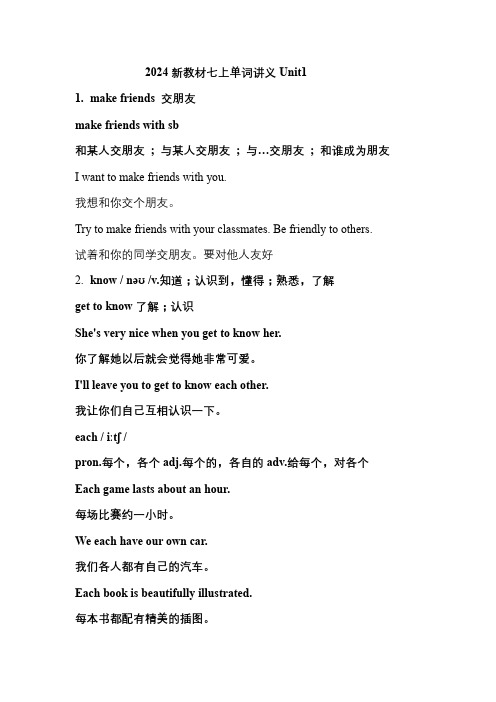
2024新教材七上单词讲义Unit11.make friends 交朋友make friends with sb和某人交朋友; 与某人交朋友; 与…交朋友; 和谁成为朋友I want to make friends with you.我想和你交个朋友。
Try to make friends with your classmates. Be friendly to others.试着和你的同学交朋友。
要对他人友好2.know / nəʊ /v.知道;认识到,懂得;熟悉,了解get to know了解;认识She's very nice when you get to know her.你了解她以后就会觉得她非常可爱。
I'll leave you to get to know each other.我让你们自己互相认识一下。
each / iːtʃ /pron.每个,各个adj.每个的,各自的adv.给每个,对各个Each game lasts about an hour.每场比赛约一小时。
We each have our own car.我们各人都有自己的汽车。
Each book is beautifully illustrated.每本书都配有精美的插图。
other/ ˈʌðə(r) /adj.( 表示与已知的人或事物不同)别的,另外的; 表示在与已知的人或事物同一类中)别的,另外的; 两个中)另一的; 一组人或事物中)其余的; 用于列举之后)其他的;对面的,相反方向的; 泛指)别 人)的,他 人)的;最近的,前不久的pron.(表示与已知的人或事物不同)另外; 表示在与已知的人或事物同一类中)另外; 两个中)另一个(the other);其余的人(或事物)the others);Are there any other questions?还有其他问题没有?Other problems may follow.其它问题也许会随之而来。
Unit1语法(复习讲义)-2023-2024学年四年级英语上册单元速记巧练(人教PEP版)

Unit 1 My classroom语法梳理:询问物品位置精讲精练(含答案)❖询问某个物品位置的句型及其答语1.句型结构:—Where is ... ? 这是一个由where引导的特殊疑问句,where意为“在哪儿”,用来提问地点。
如:—Where is it? (它在哪儿?)—It’s near the window. (它在窗户的旁边)2.答语:—It’s +方位介词on/in/under+其它。
it是代词,用来代替上文中出现的某个物品。
3.方位介词:例:The ball is near the window.球在窗子旁边。
The ball is in the box.球在盒子里面。
The ball is on the box.球在盒子上面。
The ball is under the box.球在盒子下面。
The ball is behind the box.球在盒子后面。
地点类短语:on the wall在墙上near the window在窗户旁边in the classroom在教室里on the wall在墙上near the computer在计算机旁边in your schoolbag 在你的书包里in your hand 在你的手里in your desk 在你的课桌里on your English book 在你的英语书上under your schoolbag 在你的书包下面near your pencil box 在你的铅笔盒旁边❖询问某地/物里面有什么的句型1.句型结构:—What’s in ...?此句型是由what引导的特殊疑问句,what的意思是“什么”,提问东西、事物;介词in的意思是“在……里面”。
答语可以为“There is/are + 物品+ in it.”,也可以直接回答物品名称。
如:What’s in the classroom? 教室里面有什么?One blackboard, one TV, many desks and chairs.❖用“I/We have... ”表达“我/我们有……”如:We have a new classroom.我我我我我我我我❖提出行动建议的句型—Let’s +动词原型如:Let’s go and see! 我们去看看吧!如:—Let’s go to school! 我们一起去上学吧!—Good idea! 好主意!❖名词所有格1.定义:通常表示的是有生命的物体的所属关系,“'s”所有格,具体用法如下:(1)我我我我我我我我我我我我我我我我-s我我我我我我我我我我"'s"我我我teacher’s desk 我我Mike’s classroom我我我我我(2)我-s我我我我我我我我我我我我我 ’我我我the students' books我我我我我(3)我我我我我我我我我我我我我我我我我我我我我我我我我我我's我我我我我我我我我我我Tom's and Mike's rooms.我我我我我我我我我我我(我我我我我我我我我我)我我我我我我我我我我我我我我我我我我我我我我我我我我我我's我我我我我我我我我我我Tom and Mike's room.我我我我我我我我(我我我我我我我我我我我)❖祈使句1.定义:用来表达命令、要求请求、劝告或者建议等的句子。
(完整版)五年级第一单元英语讲义unit1

Unit1.This is my day一.本单元重点.二.课文解析1. This is my day.这是我的一天。
This is his /her day.这是他/她的一天。
2. When do you get up?你什么时候起床?(1)When=What time 什么时候,几点,都是来询问什么时间的。
例如:When do you go to school? 你什么时候去学校?=What time do you go to school?(2)get up. 意思是“起床”固定搭配,它的反义词是“go to bed 上床睡觉”3. I usually get up at 6:30.usually.是频率副词,其他的频率副词有:always,总是,often,经常,通常.sometimes.有时例如:I always go to school at 8:00我总是八点去学校。
I often go to school at 8:00.我通常八点去学校。
4. Oh, look here! This is my weekend timetable.哦,看这!这是我的周末时间表。
timetable 时间表。
它是由time和table 组合成了timetable.像这样的词叫做合成词。
time时间. table 这里是”表格”的意思。
表格里的时间称之为“时间表”另外:table还有桌子的意思。
那么它和desk有什么区别呢?table:通常指吃饭、娱乐、游戏等用的“餐桌、餐台、茶几”等,一般无抽屉用短语at table:“吃饭、进餐”,at a(the) table “在桌子旁”,而不一定是在吃饭。
例如:They are at table.他们在吃饭。
He studies at the table every day. 他每天坐在桌边学习。
desk多指学习、办公用的有抽屉的“课桌、书桌、写字台”等。
如: ten desks and chairs十套课桌椅。
Unit 1 What’s the matter讲义(带答案)

Unit 1 What’s the matte r?讲义一、重点知识点梳理1. 怎么啦?出什么事情了?【解析】matter/ ' mætə(r)) /n.问题;事情【注】:matter 和trouble 为名词,其前可加the 或形容词性物主代词,wrong 是adj. 不能加the 【同义】遇到麻烦2. I had a cold.我感冒了。
have a cold=catch a cold=have the flu感冒have a fever 发烧have a cough咳嗽have a stomachache胃疼,肚子疼have a toothache牙疼have a headache头疼3. 身体部位+ ache(疼痛)构成新的复合词stomach+ache=stomachache head+ache=headache tooth+ache=toothache back+ache=backache 后背痛ear+ache=earache耳朵痛4. much too+ 形容词,意为太...... ,too much+名词,意为很多,大量。
5. enough【形容、副词】足够的/地,enough放在名前,形副后。
good enough足够好,enough money=much money6. lie down躺下,lie 躺,躺着,现在分词:lying过去式lay;lie说谎,过去式lied7. maybe“或许”,常用于句首,表示可能性,后加句子。
Maybe you are right.may be,是情态动词+be的结构,意为“可能,也许”,后加名词、代词或形容词。
He may be angry. sound like+名词代词和从句:It sounds like you don’t know the truth.It sounds like a good idea. sound+形容词,“听起来,好像”,The music sounds nice.9. need 需要,实义动词need+名词,需要某物;need to do sth.需要做某事,主语通常是人,表示人主动的动作:You need to listen carefully during class.need doing sth.主语通常是物,表示被动的动作:Your dirty clothes need washing.9.Run out &run out ofrun out 的主语一般是sth, 如:His money soon ran out. ran是run的过去式run out of的主语是sb. 如:he ran out of the money.10. I had a cold.我感冒了。
Unit1Makefriends基础知识点讲解(讲义)人教PEP版(级上册

三年级Unit1 Make friends基础知识点讲解讲义短语:shake hands握手wave your hand挥动你的手look into my eyes看着我的眼睛wave your arm挥动你的手臂point to your ear指向你的耳朵point to your mouth指向你的嘴巴a good friend一个好朋友share food分享食物句型:Hello! I'm Mike Black. 你好!我是迈克·布莱克。
Hi! My name is Wu Binbin. 我叫吴斌斌。
Nice to meet you.见到你很高兴。
Nice to meet you too.见到你(我)也很高兴。
Oh no! 噢,不!It's OK. 没关系。
语法学习:be动词(am,is,are)Be动词的一般现在时有三个形式:am, is, are,be1. 当句子的主语是第一人称单数时,用am。
eg:I am Li Ming.我是李明。
2. 当句子的主语是第三人称单数时,用is。
eg:This is a map.这是一张地图。
3. 当句子的主语是第二人称单数和所有人称的复数时,用are。
eg:Are you Jenny?你是詹妮吗?Li Ming and Danny are good friends.李明和丹尼是好朋友。
be动词口诀我(I)用am, 你(you)用are,is跟着他(he)、她(she)、它(it)。
单数名词用is,复数名词全用are。
句型解析:Hello!I'm Mike Black./Hi!My name is Wu Binbin. 你好!我是迈克·布莱克。
/嗨!我的名字是吴斌斌。
【功能】用于与他人打招呼并介绍自己。
【句型】Hello/Hi!I'm/My name is+名字. 注意I'm是I am的缩写形式。
Unit 1知识讲解-高一英语同步精品讲义(人教版2019必修第三册)

Unit 1知识讲解
语言知识回顾
Ⅰ. 重点词汇 1. range n. 一系列; 范围、界限 vi. 包括; (在一定范围内)变化 【教材原句】 They have a wide range of origins, such as the seasons of the year, religions, famous figures, and important events. (P4) 它们有着广泛的起源, 如一年中的季节、宗教、著名人物和重要事件。
5. take place vi. 发生; 举行(不用于进行时态和被动语态) 【典型例句】
Great changes have taken place in the way people communicate in recent years. 近年来, 人们交流的方式发生了巨填空 ①Some of the past colleagues could not come and they convey their _c_o_n_g_r_a_tu_l_a_ti_o_n_s_ (congratulate) to us. ②You did a good job. I send you my warmest congratulations _o_n_ your success. ③The authors are to be congratulated on _p_r_o_d_u_c_in_g_ (produce)such a great work. 完成句子 ④I’d like __to__co_n_g_r_a_t_u_la_t_e_y_o_u_o_n__your wonderful performance. 我对你的精彩表演表示祝贺。
Unit1Lesson1Lifestyles课文讲解及句子成分分析讲义高中英语北师大版
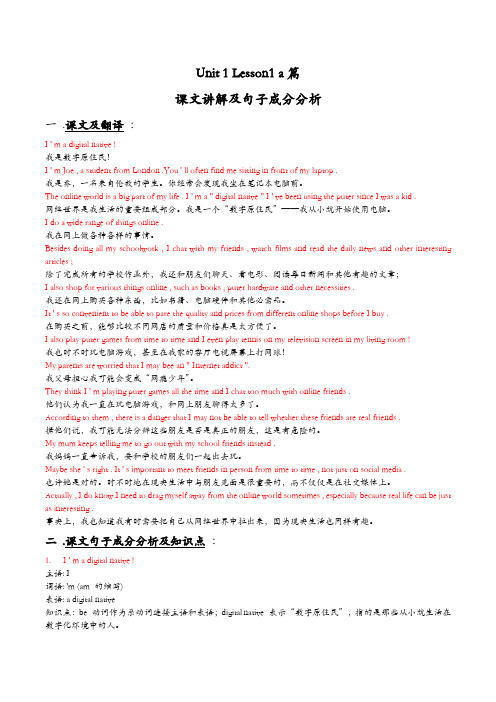
Unit 1 Lesson1 a篇课文讲解及句子成分分析一.课文及翻译:I ' m a digital native !我是数字原住民!I ' m Joe , a student from London .You ' ll often find me sitting in front of my laptop .我是乔,一名来自伦敦的学生。
你经常会发现我坐在笔记本电脑前。
The online world is a big part of my life . I ' m a " digital native " I ' ve been using the puter since I was a kid .网络世界是我生活的重要组成部分。
我是一个“数字原住民”——我从小就开始使用电脑。
I do a wide range of things online .我在网上做各种各样的事情。
Besides doing all my schoolwork , I chat with my friends , watch films and read the daily news and other interesting articles ;除了完成所有的学校作业外,我还和朋友们聊天、看电影、阅读每日新闻和其他有趣的文章;I also shop for various things online , such as books , puter hardware and other necessities .我还在网上购买各种东西,比如书籍、电脑硬件和其他必需品。
It ' s so convenient to be able to pare the quality and prices from different online shops before I buy .在购买之前,能够比较不同网店的质量和价格真是太方便了。
Unit1SectionA(学生版)七年级英语上册讲义(人教版)

Unit1 Section A-Nice to meet you,too.见到你(我)也很高兴。
知识精讲知识点01 自我介绍的两种方法My name's...=I'm...我的名字叫·····(我是·····.)My name's是My name is的缩写形式,其中is是be动词的一种形式,用于第三人称单数作主语时。
I'm是I am的缩写形式,意为“我是/叫······”。
am意为“是”,是be动词的一种形式,只用于主语是I时。
am只能和I连用.类似缩写形式what's=what ishe's=he is不可以缩写的情况①this is不可以缩写。
②在肯定回答中,不可以缩写。
如“Yes,I am.”不可以缩写成“Yes,I'm.”。
My name's Lily. =I'm Lily.我叫莉莉。
-Hi.My name's Gina.I'm Jenny.My name's Alice.=My name is Alice.我叫艾丽斯。
【即学即练1】-My Linda. What's your name?-I Jack.s;ams;is's;am's;is答案C解析:第一空填name和is的缩写形式,第二空和I搭配的be是am。
拓展:are也是be动词的一种形式,用于主语是you或名词/代词复数时。
e.g.You are our friend.你是我们的朋友。
The jackets are red.这些夹克衫是红色的。
知识点02 my的用法my用作形容词性物主代词,意为“我的”,在句中作定语,后面必须跟名词。
联想助记my所对应的人称代词主格是1,意为“我”,在句中作主语。
Unit 1 课文知识讲解(重点短语 句子解析)2024-2025学年新外研版七年级英语上册

外研版七年级上册新教材(讲义)Unit 1 A new start重点短语on the blackboard 在黑板上write down 记下start to do 开始做the first 第一个point out 指出...in the first lesson 在第一节课jump into my mind 跳进我的脑海look up at 抬头看think about 思考,想想看put up my hand 举起手来There is a mistake. 有一个错误。
Confucius 孔子Mencius 孟子well done 做得不错in fact 事实上all of you 你们所有人junior high school 初中more difficult 难度更大It’s important to do做某事这是很重要的the main idea of the passage 该文章的中心思想learn from 向…学习make mistakes 犯错it’s important for sb. to do sth.某人做事很重要。
come into 进入ask sb. to do sth 要求某人做些什么how about …怎么样fell so nervous 非常紧张地gave a silly answer 给出了一个愚蠢的答案turn red 变红with a smile 微笑着(脸上带着)make sb.+ adj. 让某人怎么样了the students' union 学生联合会at school 在学校all kinds of activities 各种活动such as 比如cultural festivals 文化节日sports meets 体育比赛sometimes 有时need to 需要describe our problems 描述我们的问题state our problems 说明我们的问题for example 例如It's hard to do sth. 这是很困难的去做......give sb. some advice 给某人一些建议the first 最先a piece of advice 一条建议the second 第二个look at 看look up 向上看/ 查阅(字典)by yourself 单独地、靠你自己problem 问题try your best 尽你所能work hard 努力工作read the passage 标题的含义find out 发现the meaning of the title 读这篇文章Do you remember...? 你还记得......吗?your sixth birthday 你的六岁生日made a paper boat 做了一艘纸船in the pool 在池中sail away 远航look at 查看It's a letter from sb. 这是某人的一封信。
Unit1(讲义+练习)-2022-2023学年四年级英语下册单元复习讲义(人教PEP版)
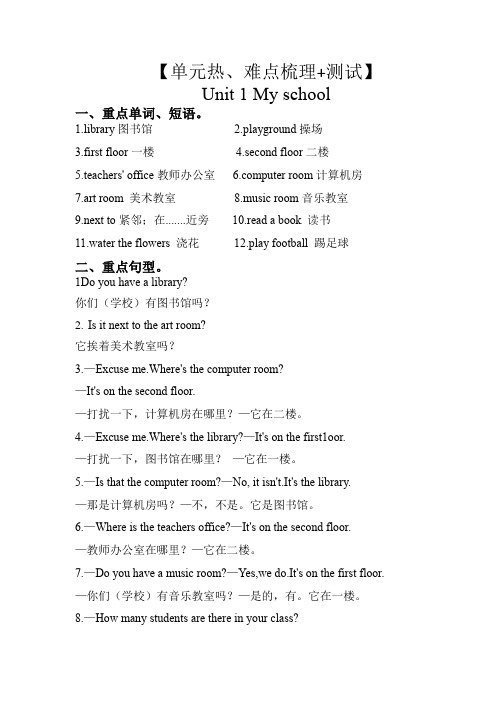
【单元热、难点梳理+测试】Unit 1 My school一、重点单词、短语。
1.library图书馆2.playground操场3.first floor一楼4.second floor二楼5.teachers' office教师办公室puter room计算机房7.art room 美术教室8.music room音乐教室9.next to紧邻;在.......近旁10.read a book 读书11.water the flowers 浇花12.play football 踢足球二、重点句型。
1Do you have a library?你们(学校)有图书馆吗?2.Is it next to the art room?它挨着美术教室吗?3.—Excuse me.Where's the computer room?—It's on the second floor.—打扰一下,计算机房在哪里?—它在二楼。
4.—Excuse me.Where's the library?—It's on the first1oor.—打扰一下,图书馆在哪里?—它在一楼。
5.—Is that the computer room?—No, it isn't.It's the library.—那是计算机房吗?—不,不是。
它是图书馆。
6.—Where is the teachers office?—It's on the second floor.—教师办公室在哪里?—它在二楼。
7.—Do you have a music room?—Yes,we do.It's on the first floor.—你们(学校)有音乐教室吗?—是的,有。
它在一楼。
8.—How many students are there in your class?—Forty-five students.—你们班里有多少学生?—四十五名学生。
Unit 1 My name’s Gina讲义及答案

Unit 1 My name is Gina.Part 1 Words and Expressionsname /neɪm/ n. 名字;名称nice /naɪs/ adj. 令人愉快的;宜人的to /tu:/ 常用于原形动词之前,表示该动词为不定式meet /mi:t/ v. 遇见;相逢too /tu:/ adv. 也;又;太your /jɔ:(r)/ pron. 你的;你们的Ms. /mɪz/ (用于女子的姓氏或姓名前,不指明婚否)女士his /hɪz/ pron. 他的and /ænd/ conj. 和;又;而her /hɜ:(r)/ pron. 她的yes /jes/ interj. 是的;可以she /ʃi:/ pron. 她he /hi:/ pron. 他no /nəʊ/ interj. 不;没有;不是not /nɒt/ adv. 不;没有zero /'zɪərəʊ/ num. 零one /wʌn/ num. 一two /tu:/ num. 二three /θri:/ num. 三four /fɔ:(r)/ num. 四five /faɪv/ num. 五six /sɪks/ num. 六seven /'sevn/ num. 七eight /eɪt/ num. 八nine /naɪn/ num. 九telephone /'telɪfəʊn/ n. 电话;电话机number /'nʌmbə/ n. 号码;数字phone /fəʊn/ n. 电话;电话机telephone/phone number 电话号码first /fɜ:(r)st/ adj. 第一first name 名字last /lɑ:st/ adj. 最后的;末尾的last name 姓friend /frend/ n. 朋友China /'tʃaɪnə/ 中国middle /'mɪdl/adj. 中间的n. 中间school /sku:l/ n. 学校middle school 中学;初中Gina /'dʒi:nə/吉娜(女名)Jenny /'dʒenɪ/珍妮(女名)Brown /braʊn/布朗(姓)Alan /'ælən/艾伦(男名)Tom /tɒm/汤姆(男名)Mike /maɪk/麦克(男名)Jack /dʒæk/杰克(男名)Mary /'meəri/玛丽(女名)Miller /'mɪlə(r)/米勒(姓)Linda /'lɪndə/琳达(女名)Jane /dʒeɪn/简(女名)Green /gri:n/ 格林(女名)Smith /smɪθ/史密斯(姓)练习:She is Mary Green. Mary is her name. Green is hername.He is Tom Miller. His family name is . His first name is. His last name is . His given name is .Part 2:TextsRole-play the conversation.Linda: Good afternoon! My name’s Linda. Are you Helen?Helen: Yes, I am. Nice to meet you, Linda.Linda: Nice to meet you, too. What’s her name?Helen: She’s Jane.Linda: Is he Jack?Helen: No, he isn’t. His name’s Mike.Structure1. What’s your name? Alan. / I’m Alan. / My name’s Alan.2. What’s his name? Eric. / He is Eric. / His name is Eric.3. What’s her name? Mary. / She’s Mary. / Her name is Mary.5. Are you Helen?Yes, I am. / No, I’m not. I’m Gina. Complete the conversation and practice it with your partner.补全对话并与同伴练习。
- 1、下载文档前请自行甄别文档内容的完整性,平台不提供额外的编辑、内容补充、找答案等附加服务。
- 2、"仅部分预览"的文档,不可在线预览部分如存在完整性等问题,可反馈申请退款(可完整预览的文档不适用该条件!)。
- 3、如文档侵犯您的权益,请联系客服反馈,我们会尽快为您处理(人工客服工作时间:9:00-18:30)。
1) To carry forward; persist in 坚持
e.g. The police will continue their investigation.
2) To carry further in time, space, or development; extend. 在时间、空间或发展上扩展,延伸
so [thus] far 到目前为止; 就此范围(程度)来说
a couple of two or three
e.g. I saw a couple of children playing in the garden.
Could you please lend me a couple of dollars?
e.g. Oranges are my favorite fruit.
Baked apples are his favorite dish.
participate
1) To take part in something:
e.g. people in that cities participated in the festivities.
e.g. Her husband is far from being handsome; he is somewhat ugly.
as far as 远到; 直到; 到...为止 ; 至于; 就...而言
as far back as 远在, 早在
by far (修饰比较级, 最高级, 表示数量、程度等)...得多; 更
trade (in)…for… exchange…. for….
e.g. He decided to trade his car for a truck.
In order to pay off his debts, he had to trade in his piano for money.
2) To share in something: 分享某事
e.g. If only I could participate in your good fortune.
要是我能分享你的好运就好了
reach out to communicate with; contact
e.g. With the introduction of the Internet, we can reach out to our friends by e-mail.
3) To cause to remain or last; retain. 继续, 使…维持原状或持续
e.g. She continued as mayor for a second term.
4) To carry on after an interruption; resume. 使…在中断后继续;重新开始
play a … role in have a position or job in…
e.g. People have come to understand that computer is playing an increasingly important role in our life.
e.g. He said he would never be intimidated by big names and authorities.
intimidate sb. into doing sth. 胁迫某人做某事
e.g. The strikers were bullied into dropping their demands.
e.g. The negotiations continued after a break for lunch.
far from
1) not …at all完全不, 非但不
e.g. Far from being angry, he is very happy.
2) rather than 远离, 远非, 远远不
a couple of minutes 几分钟
a couple of books 几本书
a pair of gloves 一副手套
a pair of scissors 一把剪刀
a pair of spectacles 一副眼镜
intimidate
to make timid; fill with fear 胁迫;威迫
be aware of having knowledge or cognizance
trade on: make use of
e.g. He traded on his brother’s kindness to get more money from him.
insight the capacity to discern the true nature of a situation; penetration.
ห้องสมุดไป่ตู้
bridge
v. I bridged a gap in the conversation by telling a joke.
我讲了个笑话,使谈话不致中断。
n. It takes four persons to play bridge.
桥牌要四个人玩。
Unit One Passage B
Unit One Passage A
at times on occasion; sometimes.
at the same time however; nonetheless.
behind the times out-of-date; old-fashioned.
for the time being temporarily.
学生需要使用书本。
3) The right to approach, enter, exit, or make use of: 出入权接近、进入、出去或使用的权力
e.g. He has access to the restricted area; he has access to classified material.
穿过那个门没有通向大街的路。
The only access to that ancient castle is along a muddy track.
到那座古老城堡去的唯一通道是一条泥泞小路。
2) The act of approaching. 接近,进入接近的行为
e.g. Students need access to books.
2) effective; helpful
e.g. Don’t just watch me; give me some positive advice.
3) definite; allowing no room for doubt
e.g. We still don’t have a positive answer as to how he did.
n. 1) One that enjoys special favor or regard.
e.g. David's a great favorite with his teacher.
These novels are my favorites.
2) One that is trusted, indulged, or preferred above all others, especially by a superior:
reach out for try to get
e.g. You must reach out for any opportunity that comes your way.
reach for hold one’s hand to get sth.
e.g. He reached for the phone and dialed the number.
Meaning: I not only didn’t feel happy answering questions, but also I didn’t want to say anything in English.
Note: With “not only” or “only” placed at the beginning of a sentence, the sentence order should be inverted as you find it in the reading passage.
from time to time once in a while; at intervals.
in no time almost instantly; immediately.
positive
1) very sure; confident 确定的,自信的
e.g. I'm positive he's right.
e.g. Only in this way can you hope to finish the work at the end of this month.
Not only did we enjoy the film, but we also had a wonderful time.
罢工者被迫放弃他们的要求
access n.
1) A means of approaching, entering, exiting, or making use of; passage.
通道,入口,出口,使用途径接近; 通道
